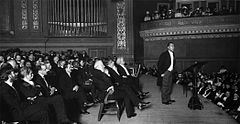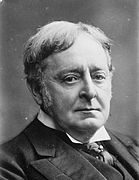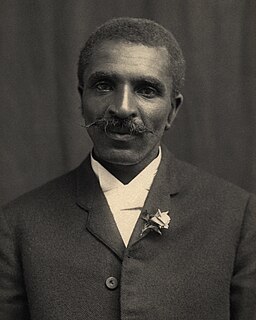
George Washington Carver was an American agricultural scientist and inventor who promoted alternative crops to cotton and methods to prevent soil depletion. He was the most prominent black scientist of the early 20th century.

Booker Taliaferro Washington was an American educator, author, orator, and adviser to several presidents of the United States. Between 1890 and 1915, Washington was the dominant leader in the African-American community and of the contemporary black elite. Washington was from the last generation of black American leaders born into slavery and became the leading voice of the former slaves and their descendants. They were newly oppressed in the South by disenfranchisement and the Jim Crow discriminatory laws enacted in the post-Reconstruction Southern states in the late 19th and early 20th centuries.
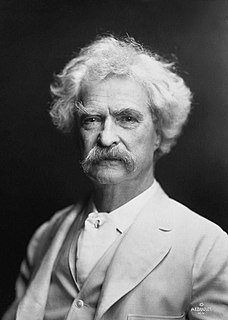
Samuel Langhorne Clemens, known by his pen name Mark Twain, was an American writer, humorist, entrepreneur, publisher, and lecturer. He was lauded as the "greatest humorist the United States has produced", and William Faulkner called him "the father of American literature". His novels include The Adventures of Tom Sawyer (1876) and its sequel, Adventures of Huckleberry Finn (1884), the latter of which has often been called the "Great American Novel".

Tuskegee University is a private, historically black land-grant university in Tuskegee, Alabama. The campus is designated as the Tuskegee Institute National Historic Site by the National Park Service. The university was home to scientist George Washington Carver and to World War II's Tuskegee Airmen.

Joseph Hodges Choate was an American lawyer and diplomat. Choate was associated with many of the most famous litigations in American legal history, including the Kansas prohibition cases, the Chinese exclusion cases, the Isaac H. Maynard election returns case, the Income Tax Suit, and the Samuel J. Tilden, Jane Stanford, and Alexander Turney Stewart will cases. In the public sphere, he was influential in the founding of the Metropolitan Museum of Art.

Rufus Choate was an American lawyer, orator, and Congressman.

Seth Low was an American educator and political figure who served as the 23rd Mayor of Brooklyn, the president of Columbia University, a diplomatic representative of the United States, and the 92nd Mayor of New York City. He was a leading municipal reformer fighting for efficiency during the Progressive Era.

Up from Slavery is the 1901 autobiography of American educator Booker T. Washington (1856–1915). The book describes his experience of working to rise up from being enslaved as a child during the Civil War, the obstacles he overcame to get an education at the new Hampton Institute, and his work establishing vocational schools like the Tuskegee Institute in Alabama to help Black people and other persecuted people of color learn useful, marketable skills and work to pull themselves, as a race, up by the bootstraps. He reflects on the generosity of teachers and philanthropists who helped educate Black and Native Americans. He describes his efforts to instill manners, breeding, health and dignity into students. His educational philosophy stresses combining academic subjects with learning a trade. Washington explained that the integration of practical subjects is partly designed to "reassure the White community of the usefulness of educating Black people".

Nicholas Platt is an American diplomat who served as U.S. Ambassador Extraordinary and Plenipotentiary to Pakistan, Philippines, Zambia, and as a high level diplomat in Canada, China, Hong Kong, and Japan. He is the former president of the Asia Society in New York City.

Robert Russa Moton was an American educator and author. He served as an administrator at Hampton Institute. In 1915 he was named principal of Tuskegee Institute, after the death of founder Booker T. Washington, a position he held for 20 years until retirement in 1935.

Joseph Hodges Choate Jr., was an American lawyer who chaired the Voluntary Committee of Lawyers, a group established in 1927 that promoted the repeal of prohibition. Upon repeal in 1933, President Franklin Roosevelt named Choate the first head of the Federal Alcohol Control Administration (FACA).

Frances Benjamin Johnston was an early American photographer and photojournalist whose career lasted for almost half a century. She is most known for her portraits, images of southern architecture, and various photographic series featuring African Americans and Native Americans at the turn of the twentieth century.

Robert Robinson Taylor was an American architect and educator. Taylor was the first African-American student enrolled at the Massachusetts Institute of Technology (MIT), and the first accredited African-American architect when he graduated in 1892. He was an early and influential member of the Tuskegee Institute faculty.
George Cheyne Shattuck Choate was an American physician and the founder of Choate House, a psychiatric sanatorium.

Choate Rosemary Hall is a private, co-educational, college-preparatory boarding school in Wallingford, Connecticut, United States. Founded in 1890, it took its present name and began a co-educational system with the 1971 merger of The Choate School for boys and Rosemary Hall for girls. It is part of the Eight Schools Association and the Ten Schools Admissions Organization. Its alumni include many members of the American political elite.
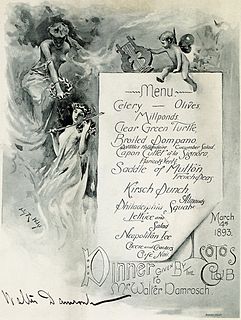
The Lotos Club was founded in 1870 as a gentlemen's club in New York City; it has since also admitted women as members. Its founders were primarily a young group of writers and critics. Mark Twain, an early member, called it the "Ace of Clubs". The Club took its name from the poem "The Lotos-Eaters" by Alfred, Lord Tennyson, which was then very popular. Lotos was thought to convey an idea of rest and harmony. Two lines from the poem were selected for the Club motto:
In the afternoon they came unto a land In which it seemed always afternoon

The Mark Twain House and Museum in Hartford, Connecticut, was the home of Samuel Langhorne Clemens and his family from 1874 to 1891. It was designed by Edward Tuckerman Potter and built in the American High Gothic style. Clemens biographer Justin Kaplan has called it "part steamboat, part medieval fortress and part cuckoo clock."

Robert Shaw Oliver was an American soldier and businessman.
Robert Curtis Ogden was a businessman who promoted education in the Southern United States.
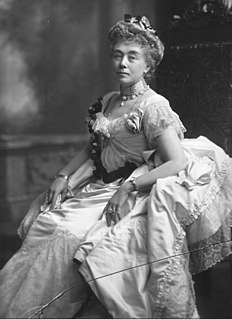
Caroline Dutcher Sterling Choate was an artist, educational reformer, suffragist, philanthropist and socialite. She was the wife of lawyer and U.S. Ambassador to the United Kingdom Joseph Hodges Choate.
